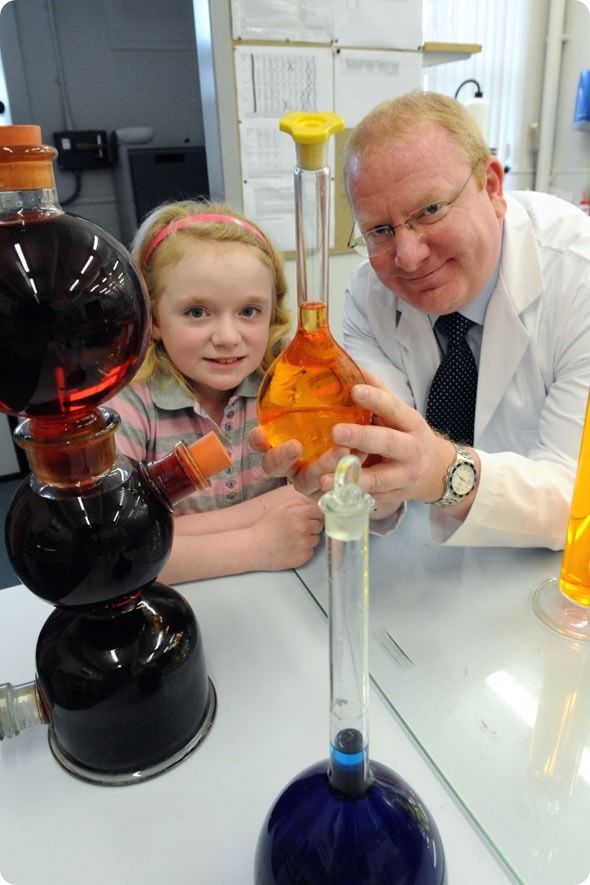A team of researchers at Robert Gordon University has secured a six figure sum from Sparks, a leading children’s medical research charity, to develop a revolutionary treatment for a rare genetic disorder.
Working between the university’s School of Pharmacy and Life Sciences and Institute of Health and Welfare Research, the team has received £101,554 from Sparks to develop a gel for the treatment of eye-related complications in patients with cystinosis.
Cystinosis is a rare disease primarily affecting children where the amino acid cystine accumulates in all body organs. Unlike regularly functioning bodies where cystine is naturally broken down, cystinotic patients suffer from the formation of crystalised deposits which, if untreated, lead to kidney failure by ten years old, progressing to the liver and eyes, and death in the second decade of life.
Cystine in the eye makes patients severely sensitive to light and induces chronic eyelid spasms. The current oral treatment for cystinosis, cysteamine which lowers the levels of the amino acid, has no effect on the eyes. As such, patients must use eye-drops on an hourly-basis to slow the accumulation of these crystal deposits.
The team of researchers, which comprises Dr Graeme Kay, Professor Donald Cairns, Dr Rachel Knott and Dr Kerr Matthews, have worked collaboratively for over five years, studying cystinosis - which currently affects around 150 children in the UK - and formulating novel approaches to its treatment.
The Sparks research grant will allow them to develop and evaluate a new approach for the treatment of the eye-related complications associated with cystinosis: an eye gel that is intended to reduce pain levels and the intense dosing schedule; increase patient compliance; and ultimately improve the patient’s standard of life.
“The difficulty with the current treatment of cystinosis is the unpleasant and time-consuming natures of the medicines themselves,” explains Dr Kay. “For example, the oral treatment is very unpalatable and therefore the compliance of patients, especially children, has always been problematic. Finding ways to get over this hurdle has been a core motivational factor for the team as it is only through a strict treatment regime that this debilitating condition can be controlled.
“Much like the research we have put into camouflaging the taste of cysteamine, the eye gel we aim to develop will hopefully make it far easier for patients to follow a regular dosage schedule that doesn’t eat into their lives. As such, this funding from Sparks is not only most welcome, but vital in helping us to improve the lives of sufferers and revolutionise the ways in which they manage the condition.”
This news has been welcomed by Roy Forsyth, the current chairperson of the Cystinosis Foundation UK. Roy’s daughter, Lena, was diagnosed with the condition at seven months old. Now 10, Lena has shown incredible positivity in managing her condition and has, along with her dad and mother Vicky, helped raise both funds and awareness of it.
The family’s relationship with the Robert Gordon University team is well established. Four years ago they helped raise funds for a new refrigerated centrifuge for the School of Pharmacy and Life Sciences that has enabled the team to accelerate their research into cystinosis.
Roy (39), who lives with his family in Mintlaw, Aberdeenshire, said: “We are delighted that SPARKS have made such a significant donation to RGU for this work. Creating an eye gel that may only have to be used once a day will make a great difference to the lives of people and their families with this rare condition. We are always glad to support the high quality work carried out by the team at the university.”
John Shanley, chief executive of Sparks, said: “The development of an eye gel which is intended not only to relieve pain but which should be less time consuming to apply, has huge potential for improving the treatment of cystinosis and the lives of the children living with this rare condition. As a charity we give careful consideration to the research we fund, so are delighted that we can give our support to this innovative piece of work.”
For further information on cystinosis and how to donate to the foundation, visit www.cystinosis.org.uk.
For more information or to donate to Sparks, visit: www.sparks.org.uk